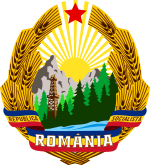
Back Comunisme nacional de Romania Catalan Nacional comunismo en Rumanía Spanish 루마니아의 국민공산주의 Korean Comunismul național din România Romanian Romanya'da ulusal komünizm Turkish
This article relies largely or entirely on a single source. (August 2016) |
| Part of a series on the |
| Socialist Republic of Romania |
|---|
 |
National communism in Romania is a term referring to a form of nationalism promoted in the Socialist Republic of Romania between the early 1960s and 1989; the term itself was not used by the Communist regime. Having its origins in Gheorghe Gheorghiu-Dej's political emancipation from the Soviet Union, it was greatly developed by Nicolae Ceaușescu, who began in 1971, through his July Theses manifesto, a national cultural revolution. Part of the national mythology was Nicolae Ceaușescu's cult of personality and the idealization of Romanian history, known in Romanian historiography as protochronism.
This nationalistic ideology was built upon a mixture of both Marxist–Leninist principles and doctrines of Romanian nationalism.[1] The driving force behind the ideology of national communism is the belief that Romanians are in isolate "Latin island" in Eastern Europe who have endless and unanimously fought off external forces throughout two thousand years to achieve unity and independence.[1]
- ^ a b Petrescu, Cristina. "Rethinking National Identity after National-Communism? The case of Romania". www.eurhistxx.de. Archived from the original on 2014-03-05. Retrieved 2014-04-03.
© MMXXIII Rich X Search. We shall prevail. All rights reserved. Rich X Search